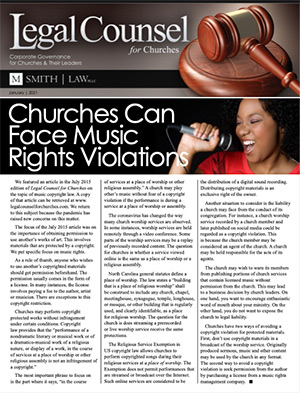We featured an article in the July 2015 edition of Legal Counsel for Churches on the topic of music copyright law. A copy of that article can be retrieved at www. legalcounselforchurches.com. We return to this subject because the pandemic has raised new concerns on this matter.
The focus of the July 2015 article was on the importance of obtaining permission to use another’s works of art. This involves materials that are protected by a copyright. We put specific focus on music rights.
As a rule of thumb, anyone who wishes to use another’s copyrighted materials should get permission beforehand. The permission usually comes in the form of a license. In many instances, the license involves paying a fee to the author, artist or musician. There are exceptions to this copyright restriction.
Churches may perform copyright protected works without infringement under certain conditions. Copyright law provides that the “performance of a nondramatic literary or musical work or of a dramatico-musical work of a religious nature, or display of a work, in the course of services at a place of worship or other religious assembly is not an infringement of a copyright.”
The most important phrase to focus on is the part where it says, “in the course of services at a place of worship or other religious assembly.” A church may play other’s music without fear of a copyright violation if the performance is during a service at a place of worship or assembly.
The coronavirus has changed the way many church worship services are observed. In some instances, worship services are held remotely through a video conference. Some parts of the worship services may be a replay of previously recorded content. The question for churches is whether a service viewed online is the same as a place of worship or a religious assembly.
North Carolina general statutes define a place of worship. The law states a “building that is a place of religious worship” shall be construed to include any church, chapel, meetinghouse, synagogue, temple, longhouse, or mosque, or other building that is regularly used, and clearly identifiable, as a place for religious worship. The question for the church is does streaming a prerecorded or live worship service receive the same protections.
The Religious Service Exemption in US copyright law allows churches to perform copyrighted songs during their religious services at a place of worship. The Exemption does not permit performances that are streamed or broadcast over the Internet. Such online services are considered to be the distribution of a digital sound recording. Distributing copyright materials is an exclusive right of the owner.
Another situation to consider is the liability a church may face from the conduct of its congregation. For instance, a church worship service recorded by a church member and later published on social media could be regarded as a copyright violation. This is because the church member may be considered an agent of the church. A church may be held responsible for the acts of its agents.
The church may wish to warn its members from publishing portions of church services that contain licensed music without permission from the church. This may lead to a business decision by church leaders. On one hand, you want to encourage enthusiastic word of mouth about your ministry. On the other hand, you do not want to expose the church to legal liability.
Churches have two ways of avoiding a copyright violation for protected materials. First, don’t use copyright materials in a broadcast of the worship service. Originally produced sermons, music and other content may be used by the church in any format. The second way to avoid a copyright violation is seek permission from the author by purchasing a license from a music rights management company.

